Pier Angeli: “And Behold—This Is My Beloved”
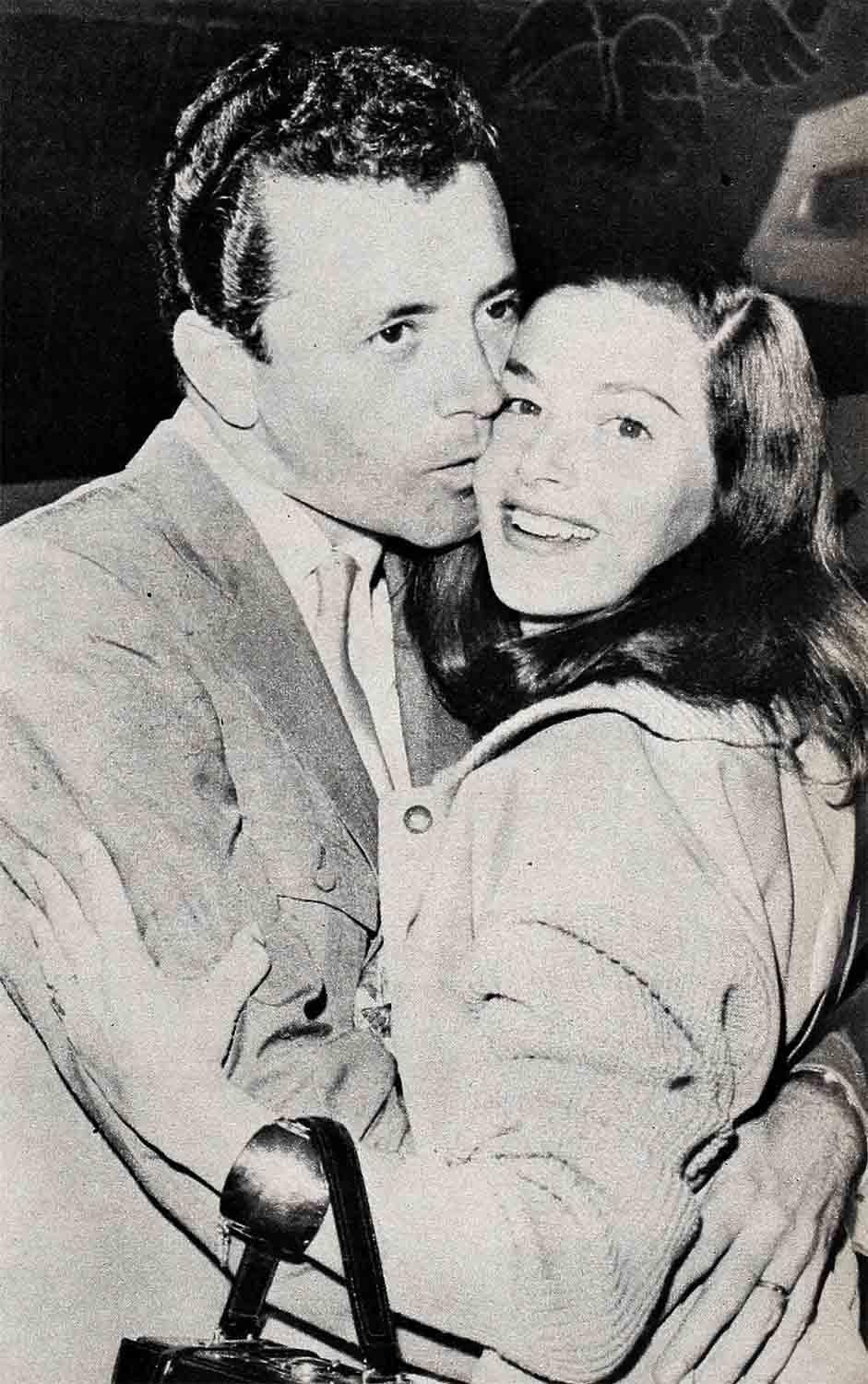
It was a very big confession and, as she made it, Pier Angeli looked more than ever like an enchanting little girl.
“Just the other day,” she admitted, clapping a hand over her mouth in brand-new consternation at the memory of the marital crime she had committed, “I have done the most awful thing. A letter came for my husband, but it is in handwriting, not typewritten, and I think the name is ‘Mrs. Vic Damone’ until I open it. And then,” her tone lowered dramatically as she looked about her as though to be sure no one could overhear this dread confession, “I realize that I have opened a-letter meant for my husband. I go straight to Vic and I say, ‘I am so sorry, Vic—but see what I have done—I have opened your letter.’” Another pause, and then, sorrowfully, “My husband, he does not say anything. He just looks at me. And I feel so bad—I cannot tell you how I feel—because my husband and I, we do not do things like that. Vic is not really angry with me, of course, he is just, maybe, a little—surprised. And I feel so guilty, as if I had been prying.”
Now a confession like this, coming from a wife—any wife—seemed a rare and Coupled with the fact that in the several years of knowing Pier Angeli, I had never known her to look more radiantly happy, younger (she is twenty-two but she looked like a young seventeen) or more beautiful, I decided to pursue this subject a little further. Because Pier Angeli, after two years of marriage and the birth of her son, Perry, is more romantically in love with her husband than ever. And, judging by the size of their telephone bills when they’re apart, Vic is even more wildly in love with his wife than he was on the day they exchanged their marriage vows.
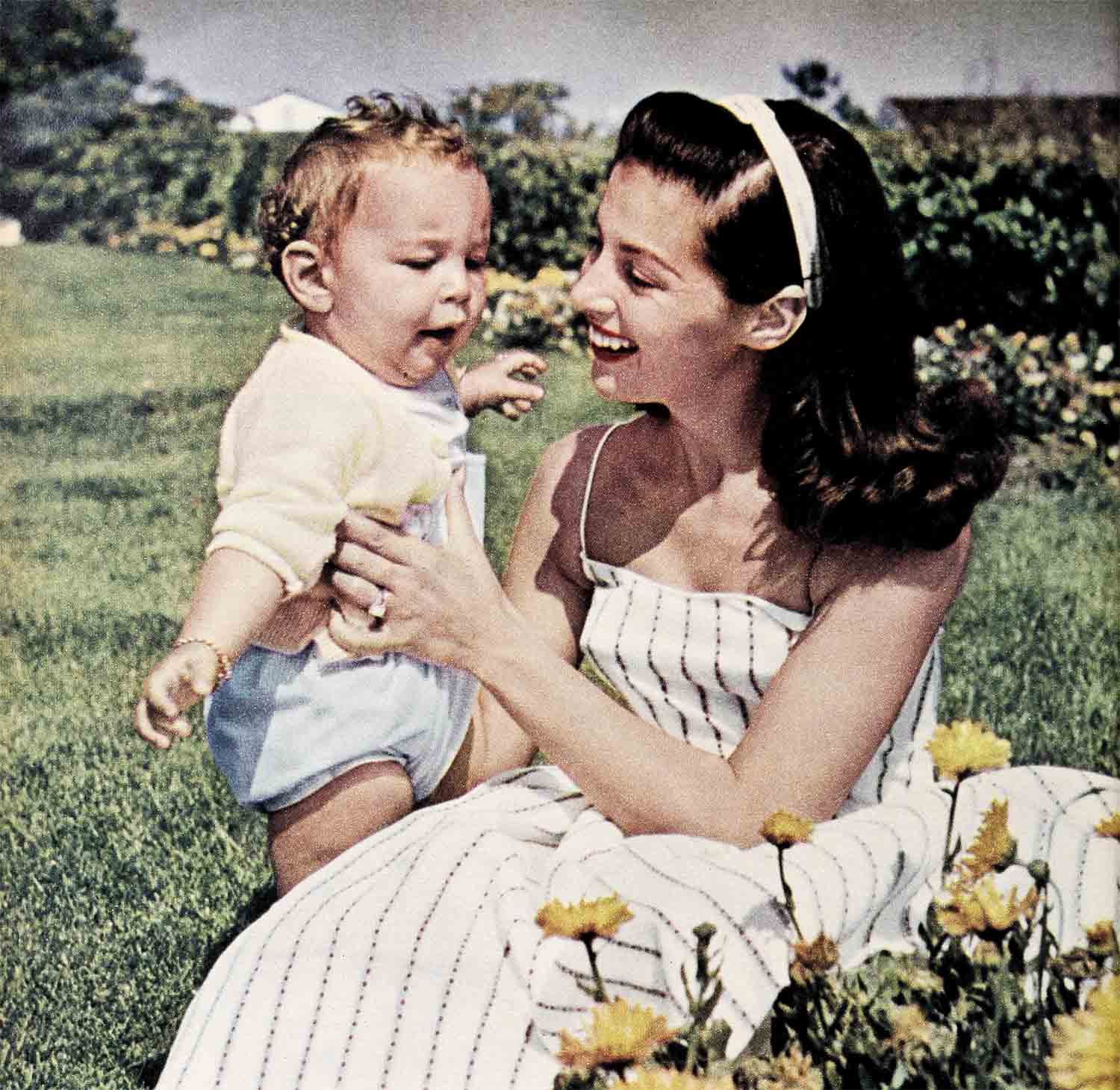
And yet, their marriage has had more problems to overcome than most marriages. Sure, you can say, but illness and separations and even in-law problems are a lot easier to cope with when you have a big income than when you’re an average young couple faced with similar problems. Some people may well contend that a young woman with Pier Angeli’s financial resources, to say nothing of her exquisite beauty, shouldn’t have too hard a time keeping a man in love with her and keeping her marriage on the high, shining plane of romance, rather than letting it settle down onto what all too often is the drab plateau of a marriage in which a couple takes one another for granted.
But on the contrary, one of the things that makes Pier Angeli’s rules for not letting a romance turn into a marriage so applicable to any young couple is that few young women have to work as hard as a movie star must work, when she’s working. And lately, with “Somebody Up There Likes Me” proving to be a box- office bonanza, and “The Vintage” being made in Paris and California, Pier is one of the hardest-working of the young Hollywood actresses. And, when she and Vic are forced to be separated by the demands of their careers, she’s as lonely without her husband as any other young wife. Likewise, when she and Vic are together, Pier is as tempted as anyone to relax completely, mentally and physically. Anyone who must appear glamorous and beautifully dressed every minute of the time she’s with people, even with close friends, would welcome a chance to more or less forget how she looked when she was in the privacy of her own home.
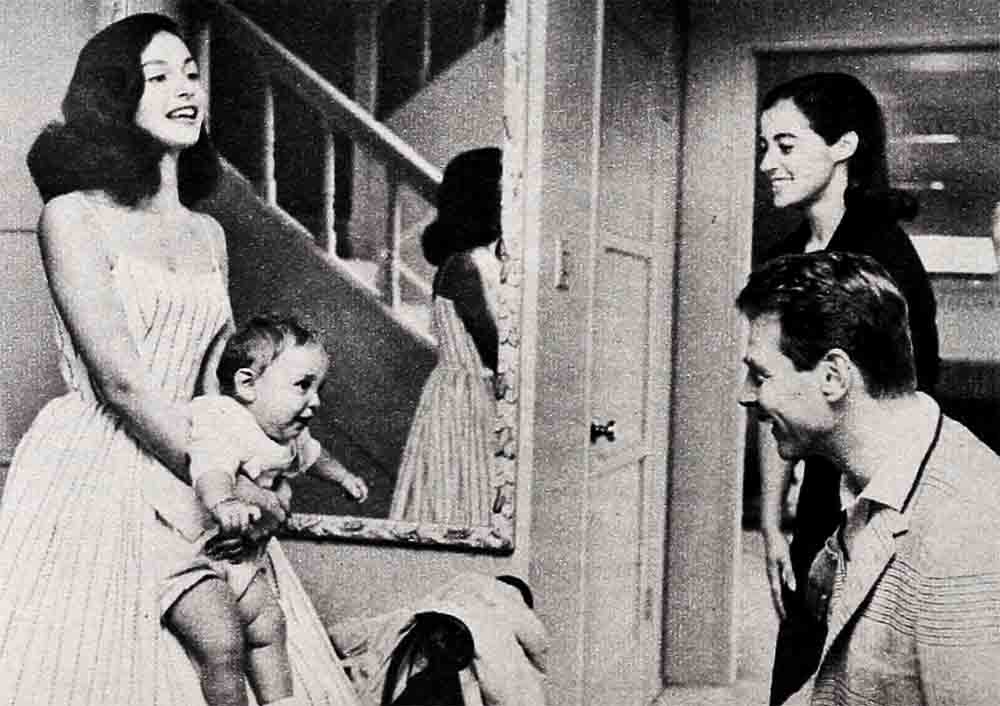
But, “No,” said Pier, putting her size-four foot down on that suggestion firmly. “A wife should always change for her | husband in the evening, and she should feel have little surprises for him. Maybe she will change the way she does her hair, or maybe it will be a new dress or a new, frilly apron, even. What it is does not matter. What matters is that he knows you care enough about him to want to look your very best for him. This is good for a man’s ego, any man. It makes him important to the most important person in his life—his wife.”
Pier confesses to the fact that she loves clothes and adds, “I am lucky, of course—this I know. God has been very good to me. I have been able to be successful in my work so that I make enough money to buy the nice clothes I like to have. But this—to be able to buy expensive clothes—this is not the important thing. The important thing is—how shall I say it? Not to go around half-dressed—coming to the breakfast table, say, in your pajamas and a bathrobe with, maybe, your hair still in curlers or cold cream on your face. It is better, I think, if a husband never knows how his wife always manages to keep her hair looking so pretty or her skin so smooth, and if she does these things in secret, when he is away. We all need romance in our lives, and if we wish to keep this romance in our marriage, I think we must ke2p some things a secret. Some part of ourselves we must keep to ourselves. It is not right that married people feel they must know everything, every little thing, about one another.”
This, for Pier, means never, never to open a letter addressed to her husband. It means never saying, at the end of a telephone conversation, “Who was that? What did he want?” and so on, as so many of us are so sorely tempted to do, especially when our end of the conversation sounds provocative. It means, above all, recognizing the right of each person, even in the intimacy of a marriage, to a little part of himself that he may keep inviolate.
“Married people,” Pier believes, “should be not only lovers, but good friends as well, with a deep, mutual respect for one another’s need for privacy. My husband turns to me always for help in his career and in his life, just as I turn to him. But always it is that we turn to one another, not that the other tries to—well, to pry. You know?”
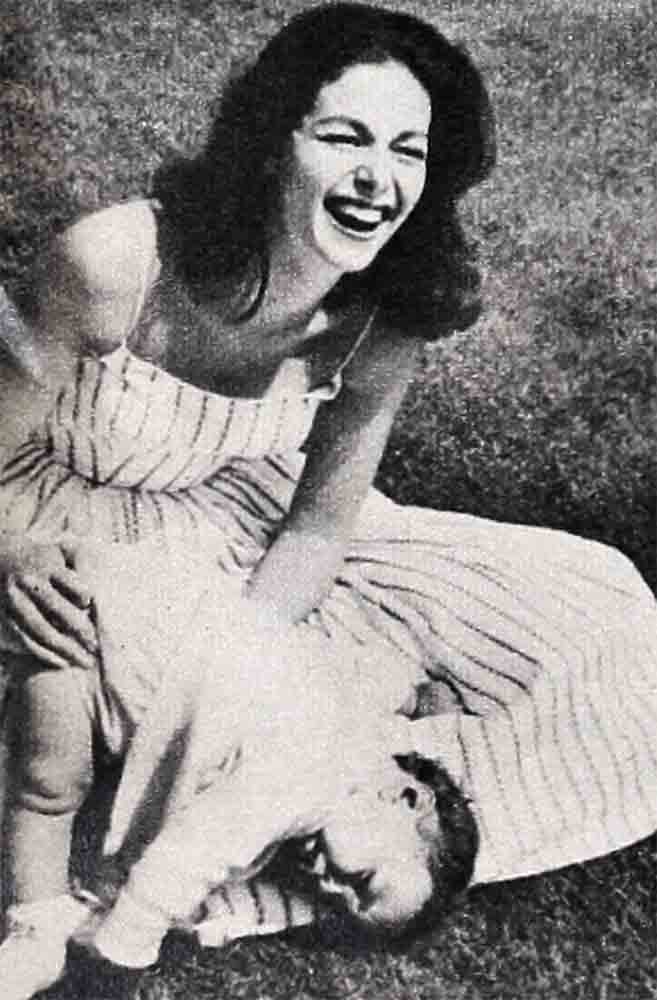
And, indeed, we did know. There are probably few of us who do not number among our families or friends those well- intentioned people whose feelings are deeply hurt if every telephone call, every message, every date and every letter is not immediately made a matter for family discussion. Most of us have had at least one woman friend confide, in hurt tones, “I don’t know what’s come over my husband lately. He won’t tell me anything any more.” What these good souls really mean, of course—as any marriage counselor would probably be quick to point out—is that they’re hurt, not because their husbands won’t tell them anything, but because their husbands, or their teen-age children, won’t tell them everything.
The marriage of Vic Damone and Pier Angeli started off with several strikes against it. Pier’s mother, Mrs. Pierangeli, wasn’t at all sure that Vic was the right husband for her daughter. Well, hundreds of thousands of mothers have had similar doubts about any number of fine, future sons-in-law. Having the fledgling leave the nest is always a painful experience. But Pier, like any other young bride, had to follow the dictates of her heart, and that heart had been given completely, without reservations or doubts of any kind, to Vic. When Mrs. Pierangeli realized that and saw their happiness together, she realized that Pier had chosen rightly.
Their marriage faced more trials, and near-tragedy, the time Pier was seriously injured when a lurching plane, on which she was a passenger, threw her forcibly against a seat during her pregnancy, fracturing her pelvis. For long weeks, she lay in bed saying to the attending doctors, “My baby—please save my baby!” and again, as Pier has said, God was good to her and her baby was saved. Now a year old, Perry Damone is one of the most beautiful babies anyone has ever seen, with a mass of light-brown, curling hair, Pier’s enormous dark eyes and Vic’s engagingly boyish grin. Born and reared in this atmosphere of love, Perry has a sunny disposition. He has already accompanied his mother on one trip overseas and will undoubtedly accompany her and his father on many more journeys in the future.
“But our phone bills!” said Pier of these separations. “I am ashamed to tell you how much they are. Every day, Vic calls me or I call him, and after we have talked for an hour and I want to hang up, he says, ‘What’s wrong, Anna Marie? You’re angry with me. You’ve hardly said a thing.’ No wonder,” she chuckled, “I love my husband.”
No wonder, too, that her husband loves her. And to be sure that the tingling, bubbling excitement they still feel in one another’s presence never settles, to be sure that the bubbles of romance never go out of the champagne of their marriage, Pier not only surprises Vic with some change in her appearance almost every day they’re together, she surprises him with a complete change of mood. She is the serious young wife who sits up with him, talking over their careers, their problems, their son, until a rosy dawn has finger-painted the sky beyond their window. A day later, Vic comes home to find a wife who is a gay and enchanting gamin, who greets him at the door at eleven o’clock at night, when he is exhausted after a TV appearance, and says, “You look much too serious, Vic. And I—I feel silly tonight. I don’t know why, but we have been too serious too long. Let’s be silly tonight.”
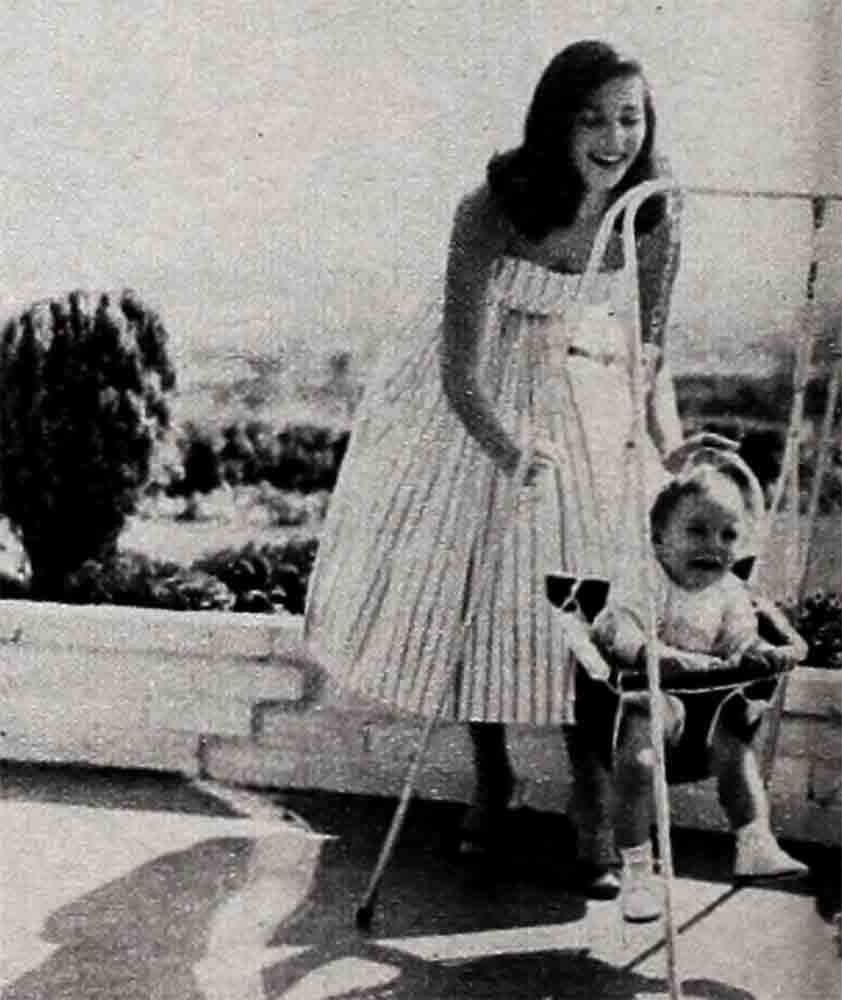
A great part of Pier Angeli’s charm is that ability of hers to move swiftly from mood to mood, with the many emotions of which she is capable, flitting like vagrant beams of sunlight across her lovely, expressive face. Pier Angeli cares deeply, she cares rather terribly, she cares with all of her being about all things, large and small. She has no small talk, which you discover after just a few minutes spent chatting with her. Instantly, the talk will swerve to something solid, if not necessarily momentous, but you can have that side of her, too, if you wish. The side that has read good, enriching books and has garnered a more than working knowledge of fine art. The side that has been the fertile soil of an inquiring mind that has traveled halfway around the world and back, observing and questioning and taking in the fruits of many cultures, many lands and many people.
This is difficult to believe of anyone as frail and fragile as Pier, but there is nothing frail or fragile about her mind or her will. Before fame and love and marriage came to her, Pier had her individual heartaches and tragedies, just as we all have. One of the keenest losses she suffered was the loss of her father, to whom she was devoted with all the intensity of which she is capable. In fact, when her beautiful and beautifully groomed but very long fingernails had to be cut for her role of Rocky Graziano’s wife in, “Somebody Up There Likes Me,” Pier was almost in tears.
“You would have thought,” she admits now, “that they were going to cut off, not my fingernails, but my head, judging by the way I protested. But my father, he always liked a girl to have long fingernails—provided, of course, they are cared for. So when the director tells me I must have my nails cut, I say, ‘No, please! I will wear gloves in the close-up scenes, but please do not make me cut my nails.’ But the director makes me realize, of course, that
I cannot go through a whole picture wearing gloves, and so I let them cut my nails. But,” exhibiting them like a happy child, “you see, now they have grown again!”
This eagerness to please, to be what the man she loves wants her to be, is another reason why the Vic Damone-Pier Angeli marriage is, so far, one to envy. There is no doubt at all in anyone’s mind, including Vic’s, that if—despite her sentimental feelings about her father—Vic insisted that she have short nails, Pier would retire to her room, like a little girl, to regard those long nails sadly and wistfully, and then she would pick up a pair of scissors and minutes later she would emerge to say, “You see—for you, just for you I do this.”
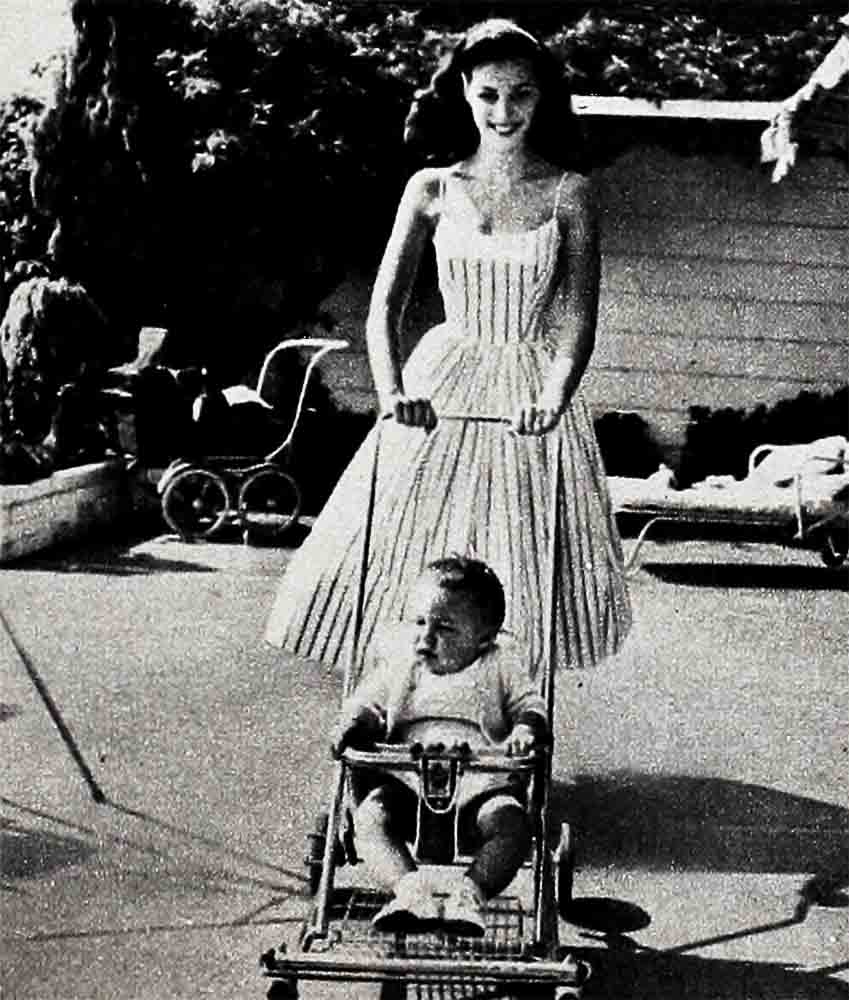
In “The Vintage,” the picture she is making abroad, Pier plays the part of just such a girl—a tiny gamin, a child with the heart and soul and understanding of a woman. She plays the part of a girl who falls in love with a man much older than she. He, of course, falls hopelessly in love with her, but feels that the difference in their ages is an insurmountable obstacle to their love and happiness.
“But age,” Pier says, back in her role of the thoughtful woman again, “has nothing to do with one’s years. Look at my sister, Marisa. She is married to a man much older than she, yet seldom have I seen two people who are happier or who are more in love. If a girl knows in her
heart what she wants, then she will be happy. Not until and not before.”
Pier’s own romance with Vic points this up, too, as it points up her deep understanding of herself. When Vic first asked her to marry him, when they met in Germany and he was in the Army, Pier knew she wasn’t ready for marriage. There was so much for her to see and do and be, first, and she must be very sure, she must know her own heart absolutely.
Everyone knows of her friendship with Kirk Douglas, of whom she still says, “He is one of the most wonderful people in the world. I hope I may always count him and his lovely wife among my close friends.” Then came her romance with the late Jimmy Dean, of which her mother deeply and even violently disapproved, Pierangeli did not think Jimmy adult enough or mature enough to take on the responsibilities of marriage. But the end of that romance must have brought its heartaches, too, and its pangs. And then, when she and Vic met again in a small cafe opposite the M-G-M studios, and they played “our song” on a jukebox, somehow all the attraction that had been there before, when she was not quite ready for love, sprang to life again. Before they left the cafe, they were engaged.
“When love comes,” Pier says wistfully of this, “nothing matters, except that you are together, that you reach out and touch the other person ever so lightly. A touch of a fingertip, perhaps—and for you, it is as though you had embraced, as though you had kissed each other.”
To cut through the complexities of life to the simple truths that bind and direct our days is a difficult thing for anyone to do, but that is what Pier and Vic try to do. To come together at each day’s end both as lovers and as friends. Never to take one another for granted, always to be deeply touched and stirred again by the simple miracle of the love that brought them together and that gives meaning to each day that dawns.
No one, least of all Pier Angeli, suggests that her marriage is perfect. On the contrary, she will tell you that they have their budget problems, their career problems; that, like any wife, she works hard at the job of running her home, running her career, and keeping her husband’s love. But then again she will turn to you and say, “But life is so short, we must make it as perfect as we can, mustn’t we?”
Late afternoon sunlight spilled through the high windows of the restaurant where we had been talking and lunching. With a start, we noticed that the other diners had long since left and almost every table but ours was cleared. The headwaiter who, like everyone else, had fallen in love with Pier the moment he laid eyes upon her, insisted that we not hurry. But Pier glanced at her watch and said, “Vic will be waiting for me. I have been away from him for two hours and already I feel as though I have been away from him two years. This,” she sighed, “is silly, I suppose, but this is the way I feel.”
A little girl just five-feet-one and weighing one hundred pounds, wearing a beige suit that emphasized her twenty-inch waistline, with her shining dark hair pulled straight back from the pale oval of her face and worn in a pony tail, she did not look like a wife and mother. She looked like what she was—a girl in love, hurrying to join her beloved. She would make a gay and amusing story of her luncheon interview. She would say, “How do you think I sounded? Did I sound too smug, perhaps, because I am so lucky and so happy?”
No one will ever know Vic’s answer to that as, perhaps, he pulled her down into his lap, as he said, “You’re such a little girl, Anna Marie, and such a wonderful woman.”
But any man would envy him. And yet, any woman can make the man she loves feel as Vic feels about his Anna Marie—that he is her whole world. That is the way a man hungers to feel—that each night, when he comes home, he is a king re-entering his kingdom. Pier Angeli has found how to make this small, daily miracle come true.
For this, at least, there is no secret formula. A single word unlocks the door. The word, of course, is love.
THE END
It is a quote. PHOTOPLAY MAGAZINE OCTOBER 1956




